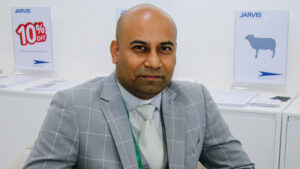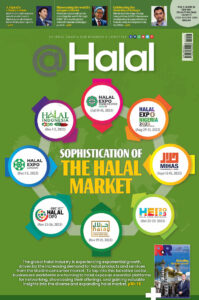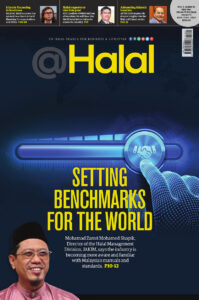Utilising technology in the halal industry will help provide more efficiency and transparency in various sector segments. The Saudi International Halal Expo 2022, being an international halal expo, showcased some of the greatest offerings and innovations from international companies like Jarvis Products Corporation and Azentio Software to its visitors.
Using technology in halal meat processing
Jarvis – a company that designs, engineers, and services the most reliable power tools and automated machinery for meat, poultry and fish industries. Syed Waqar Ahmad, the General Manager for Jarvis in Turkiye, Central Asia and the Middle East region, said it was their first time in Saudi Arabia.
“We are Jarvis, the manufacturer of halal slaughtering tools for the halal market. Halal is crucial in this region, especially in meat, poultry, etc. Jarvis is trying to meet all the requirements of our customers who look for halal things. We ensure the food is safe; the meat is hygienic.

“With our new technology and power tools, we make sure that we have better tools which can comply with all requirements of halal consumers,” he elaborated.
Looking at Vision 2030 of Saudi Arabia, Syed said many opportunities were coming in from the Kingdom, especially regarding halal food. The country must upgrade its technology to ensure food security and safety.
“We look forward to this and are interested in the halal market. We want to do much more and support our consumers and producers.”
Utilising blockchain in the halal industry
Azentio Software provides mission-critical, core and vertical-specific software products for clients across the Middle East, Africa, Asia Pacific, and India. During Saudi International Halal Expo 2022, the company launched Azentio ONEERP for Halal Industry, a one-of-a-kind competitive solution that brings the power of blockchain and cloud to halal supply chain management processes.
The platform-agnostic ERP is impressively engineered to provide dynamic and unique functionalities that align with halal industry requirements.
Anish Kanaran, the Vice President (MEA) of Azentio Software, said the company saw the growth of the halal industry and noticed that it was a niche industry not only for food and beverages but can be applied to cosmetics, textiles, etc.

Touching on blockchain usage, Anish said: “From the customer’s perspective, what they can do is they can keep track of all certifications and requirements of the halal industry, which are all maintained in our system. If they are expanding to any new country, they can be sure to market their products in a shorter time. It takes longer to do the process manually.
“Today, traceability is the key. If you look at the industry, you can look at it from the source. In the food industry, we can say from farm to fork. If you have traceability, you can identify from which cow you get the meat. This is the kind of traceability you can get through the blockchain.
“The industry must make sure what is consumed by the consumers is from the right source. Having such a foolproof system, you can trace back to the source if there is any contamination. That’s when you, as a company, can fix an issue much faster and be more responsive to a situation.”








